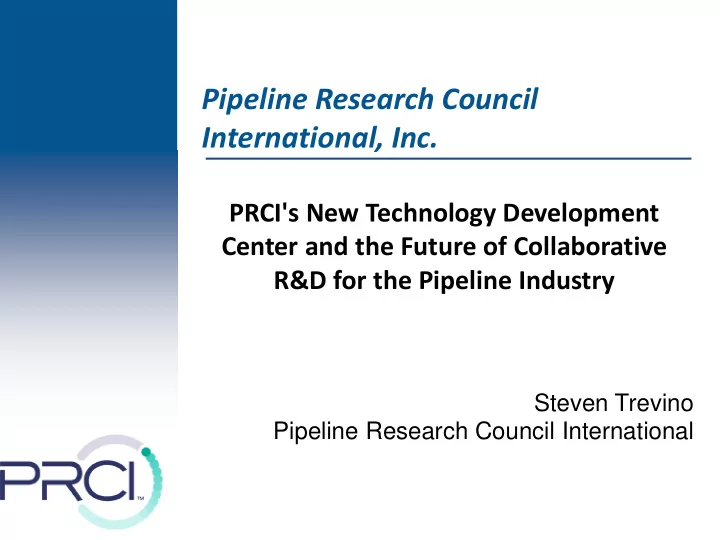

Pipeline Research Council International, Inc. PRCI's New Technology Development Center and the Future of Collaborative R&D for the Pipeline Industry Steven Trevino Pipeline Research Council International
Agenda 2 Who is PRCI Research Program Overview Technology Development Center Way Forward Current Projects
Pipeline Research Council International, Inc. 3 PIPELINE RESEARCH Natural Gas Knowledge Crude Oil & Petroleum Products Technology Biofuels Deployment & Transfer CO 2 Innovation Related Facilities COUNCIL INTERNATIONAL Forum for Ideas & Opportunities North America Peer-based Europe Industry-driven South America Source of Research Inventory Middle East Asia Australia Africa
PRCI Membership 4 38 Energy Pipeline Operating Companies 21 Natural Gas Transmission; 9 Liquid 8 Liquid/Natural Gas 3 Pipeline Industry Organization (PIO) Members Association of Oil Pipe Lines (AOPL) Electric Power Research Institute (EPRI) Operations Technology Development (OTD) 37 Associate Members & Technical Program Associate Members Australia, Canada, China, Europe, Japan, Mexico, U.S. Special Membership – Australian Pipeline Industry Association (APIA) Worldwide Research Organization 43 U.S. Companies 35 Non-U.S. (Australia, Brazil, Canada, China, Europe, Japan, Mexico, Saudi Arabia, South Africa)
5
6
7
PRCI Research Implementation 8 Technical Committees (6) Three each in the Pipeline & Facilities Programs One committee for identifying Longer-term and Cross-over Opportunities Each operates under a Board-approved charter Develop & maintain roadmaps to achieve PRCI research objectives Provide essential peer review of research results Provide oversight & continuity of, and among, projects under the TC Project & Program Teams Comprised of voting members from funding companies • Hold the decision-making authority on each project/program • Approve research results on behalf of their companies & PRCI Larger projects/programs usually led by 3-5 person core management group Any PRCI member company can participate on the team This is where the core mission is executed
9 PRCI TECHNOLOGY DEVELOPMENT CENTER
Key Components of the TDC 10 Availability of samples with real flaws Samples and a wide range of morphologies. Have a fixed reference point or Calibration/Base- benchmark – what are we comparing lining performance to. Testing & Test a range of tools, types, procedures and the influence of human factors. Proctoring Analysis & Establish what the data is telling us and get the data out to the industry – make Publication use of the R&D. Retain the benchmarks for Legacy improvement – provide for education, development and measuring, i.e., are we improving?
Five Year Vision 11 Transition from an NDE “Repository” to a recognized world class Technology Development Center The Houston facility is the global center for accessing real- world pipeline samples; there is no lack of samples representative of damage that occurs in the industry A facility where actual testing work across the PRCI committees can be undertaken – no project is delayed waiting on suitable access to samples & facilities. A facility where industry can meet and work on projects, data exchanges with video conferencing and links to the PRCI members around the world. PRCI has partnered with academia and other associations to offer pipeline engineering training courses within the center and hands on training which also extends to supervising and conducting R&D on PRCI projects.
PRCI External Rendering 12
Current Aerial View 13
TDC Overview 14
15
Grand Opening Ceremony 16 Wednesday July 15, 2015
17 Way Forward
What is Next? 18 High-Impact Programs of Interest Crack Management Program Right of Way Monitoring Leak Detection Technology Deployment Center Industry Drive for Zero Incidents Huge Challenge and Commitment – PRCI is focal point for industry Pipeline R&D – technology has improved but generally is evolutionary The industry needs to “move the needle quickly” PRCI Research & Innovation Requires new technologies for zero incidents The challenges of aging infrastructure
View to the Future 19 Partnerships Develop models to increase stakeholder collaboration Increase partnerships with stakeholder associations, industry associations and government agencies; member company internal R&D Research Leverage PRCI Technical Committees to target additional research Utilize PRCI’s collaborative model to focus research on common interests Gain Consensus on Priorities – Topically, Sector-based, Regionally Implementation Assure Transfer of Knowledge – Products, Standards, Best Practices, Rulemaking, & Regulations; Work Directly with Member Companies Look for first adopters and opportunity for technology uptake Increasing scrutiny – public, shareholders, government • Manage perceptions of aging infrastructure with technology and knowledge • Safety and R&D funding
20 Questions Thank You!
Recommend
More recommend